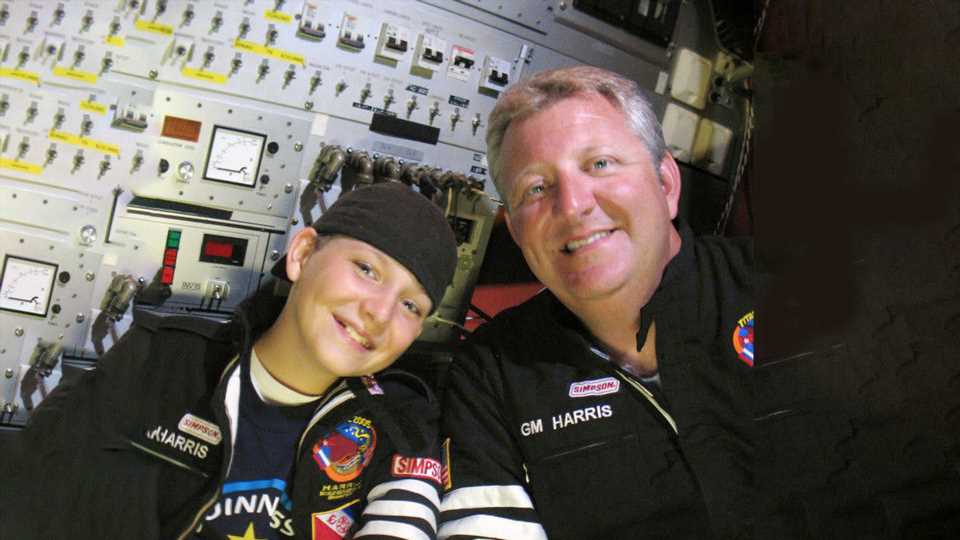THE youngest person ever to dive the wreck site of the Titanic has revealed the "violent" and merciless conditions the five people aboard a missing submarine will have had to endure to survive – as the time left to find them slowly runs out.
Sebastian Harris, son of Titanic expedition leader G. Michael Harris, told The U.S. Sun that he's holding onto hope the crew aboard the OceanGate submersible that vanished on Sunday will soon be rescued but odds of survival are firmly stacked against them.
Harris – who became the youngest ever person to dive to the site of the Titanic in 2005, aged 13 – said it's his belief that the OceanGate sub, named Titan, most likely imploded during its initial descent to the ocean floor.
However, if the sub is still intact, and its crew still alive, Harris said they would've had to endure some truly horrific conditions over the last few days that he wouldn't wish upon his worst enemy.
Making matters even more difficult, he says, is that the chance of locating the vessel before their oxygen supply runs dry "is less favorable" than finding a needle in a haystack – meaning all their agony and suffering may likely come in vain.
"If they are still out there somewhere, even in the best-case scenario where they are at the surface of the ocean awaiting rescue, on a good day in the North Atlantic Ocean there are 10-foot waves, and that's on a calm day," he said.
"And they'll be essentially rolling around on the inside of what is basically a minivan and doing that for four days or so, not knowing if anybody even knows where you are, I just can't imagine what they must be going through – it's terrible."
If the sub is stuck somewhere near the ocean floor, or entangled somewhere within the wreckage of the Titanic, Harris says the conditions may be even more brutal.
"That would be just complete hell," said Harris. "I can't imagine it.
"It's so dark [down there]. It's cold. The ocean has a certain violence to it and they're down there with four other people with limited rations, limited opportunities to use the restroom, there's a ticking clock on their oxygen, and there's no way out.
Most read in The US Sun
Dad 'killed daughter, 2, by smashing into lorry' as devastated mum shares tribute
Man hacked 2 people with PICKAXE at hospital before turning blade on himself
Rescue ships launch last-ditch bid to find Titanic sub before oxygen runs out
Michelle Keegan flashes bum in bikini as she parties on a yacht
"The level of fear and anxiety would just be unimaginable.
"If we assume for a second – and I don't know if you'd call it a worst-case scenario because what I've just described sounds pretty horrible to me – that there was a small puncture in the hull, it takes about two milliseconds for the submarine to implode.
"As I've been told, it takes four milliseconds for your spinal column to register that something like that has happened.
"So as horrible as it is to lose anybody, that is almost a level of mercy compared to slow suffering, just rolling around somewhere in the ocean."
Harris continued: "You just hope these individuals can be rescued and that they're OK, but the flip side is you don't want them suffering through all of this for such a long period of time.
"I'm sure if you could ask these individuals, they would probably suffer a whole lot if it means coming home.
"But they're not in a pleasant or easy situation right now, that's for sure."
RACE AGAINST TIME
The Titan's oxygen supply is due to run dry by Thursday morning.
The 22-foot-long sub lost contact with its mother ship at around 9.46am on Sunday directly above the wreck site of the Titanic, some 400 miles off the coast of Newfoundland, Canada. It wasn't reported missing to the Coast Guard for another eight hours.
No concrete traces of the vessel have been yielded since but an increasingly frantic search continues in the Atlantic.
On Wednesday, officials with The U.S. Coast Guard's (USCG) Boston division confirmed that rescuers are concentrating efforts on a remote area where undersea noises were detected by sonar technology.
The sounds, which one expert referred to as "banging noises", were first picked up on by a Canadian P-3 flight crew on Tuesday morning.
It's hard enough to recover plates, cups, and other small items from the wreckage. That can be immensely challenging, much less a vehicle.
Citing internal Department of Homeland Security emails, a report in Rolling Stone claimed that officials heard the mysterious sounds in regular 30-minute intervals.
The sounds were heard again several times throughout Wednesday, U.S. Coast Guard spokesman Capt. Jamie Frederick said during a press conference.
Frederick, however, refused to confirm the frequency at which the sounds were heard and said analysis of the noises has been "inconclusive."
"When you're in the middle of a search-and-rescue case, you always have hope," he said.
"With respect to the noises specifically, we don't know what they are, to be frank with you."
Carl Hartsfield, an expert in subsea acoustics from the Woods Hole Oceanographic Institute, added: "The ocean is a very complex place.
"Obviously, [there are] human sounds, nature sounds, and it’s very difficult to discern what the source of those noises are, at times.
"But I can tell you that this team has multiple sensors, they’re in the area, they’re sending data back expeditiously to the best in the world, people to analyze that data, and then they’re feeding the results of that analysis back to the unified team and they’re making decisions.”
USCG's search for the Titan has expanded to twice the size of Connecticut, said Fredericks, and more reinforcements are on the way to assist.
An expert submariner from the British Royal Navy has already been summoned in to help, and a team of “highly trained" French remotely operated vehicle (ROV) operators are currently en route to the site.
Harris, like Frederick and Hartsfield, said the bangs heard across Tuesday and Wednesday could be caused by a multitude of things and don't necessarily bring cause for much hope.
Even if the submersible is located, retrieving it presents huge logistical challenges, given the extreme conditions miles below the surface, he says.
"At this time, I'd say they're looking for a needle in a haystack – but finding that needle would be a more favorable position," he said.
"If they do happen to find them, I don't know what the timeline looks like to get other submersibles out there that could reach those depths.
"There's maybe only three or four in the world that are currently rated for that depth, and it would be very challenging to recover the sub at that level.
"From what I've heard there is some pretty state-of-the-art technology being sent over, specifically from the French government, but they likely won't get there until tomorrow.
"And by that point, it will probably be too late.
"It's hard enough to recover plates, cups, and other small items from the wreckage," he added.
"That can be immensely challenging, much less a vehicle."
OMINOUS PROJECTION
Harris's father, G. Michael Harris, a Titanic diver who has made multiple visits to the wreck to recover artifacts, revealed earlier this week that he knows three or the five people aboard the Titan.
Those three passengers were British Billionaire Hamish Harding, the legendary French diver Paul-Henry Nargeolet, and OceanGate CEO and founder Stockton Rush.
The remaining two passengers have been identified as British-based Pakistani tycoon Shahzada Dawood, and his 19-year-old son Suleman Dawood.
Harris Snr. told Fox News on Tuesday that their chances of survival are "not looking good."
Sebastian Harris reluctantly shares his father's cynical projections.
"The optimist in me wants to say there is always still a chance; call it luck, fate, karma – whatever you want to call it," he said.
"But the cynic in me defers to my original hypothesis that, based on the information we have and where they were in the water when they lost communication, an implosion is much more likely.
"And then if that is the case, as morbid and sad as it would be, I would hope there's at least some level of comfort for these people's families that they didn't experience the fear and anxiety and terror that they may be dealing with as we speak."
WARNING SIGNS
OceanGate has been providing tours of the Titanic site since 2021, charging guests up to $250,000 per head to catch a first-hand glimpse of the so-called "unsinkable ship" that sank during a transatlantic voyage in April 1912.
However, experts from within and outside OceanGate raised concerns about the safety of its Titan submersible as far back as 2018.
A number of the complaints have resurfaced this week.
One ex-OceanGate Expeditions employee hired to protect the safety of submersibles and their passengers and crew, years ago claimed that Rush and other company executives ignored warning signs the Titan may be unsafe.
Similar concerns, along with the claim that the company had ignored industry-wide safety standards, were echoed in a letter delivered to the company that same year by the Marine Technology Society, according to The New York Times.
In a statement to NPR, Will Kohnen, the chair of the Marine Technology Society's Submarine Committee, said the disappearance of the Titan "hasn't surprised us."
"We've been aware of this project for some time and have had some concerns," said Kohnen, adding the group's main concern was a lack of oversight and adherence to industry-accepted safety guidelines.
"Most of the companies in this industry that are building submersibles and deep submersibles follow a fairly well-established framework of certification and verification and oversight, through classification societies," he said.
"And that was at the root of OceanGate's project, is that they were going to go solo, going without that type of official oversight, and that brought a lot of concerns."
Two former passengers on the Titan spoke to The U.S. Sun about their experiences aboard the vessel.
Mike Reiss, a writer for The Simpsons, and David Pogue, a reporter for CBS Sunday Morning, both went on separate excursions with OceanGate last year.
Both of the men said they witnessed the vessel experience various communication and navigational issues.
They also said Stockton Rush was open and honest about the dangers and potential catastrophes that awaited them beneath the surface of the ocean – however, Rush's concerns differed greatly from theirs.
"It was always a risk and he never hid that from you," said Reiss.
"Things go wrong all the time. This is not a rollercoaster, this is not a thrill ride; this is an exploration and this is a new kind of exploration.
"To him, it's like the early days of the space program or the early days of aviation where you're just kind of making it up as you go along.
"You are part of the initial launch and you're the test pilots seeing if this thing is going to work.
Read More On The Sun
I’m a pregnant mum-of-2 and we live in a tent after our landlord kicked us out
BA stewardess makes huge blunder – costing airline £50k & forcing her to fly home
"The possibility of death and catastrophe just hangs over it, it's part of what you're doing and you know that going into it."
Source: Read Full Article



















